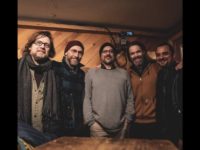by Mark Saleski
Back in the late 1980s, there was a backlash of sorts against the new traditionalist tendencies in mainstream jazz. Wynton Marsalis and his cohorts had come along to celebrate (and honestly, expand upon) the early strengths of bop and, as usual, the major labels started releasing like material by the truckload. Listeners tired of the “young lions” trend and commence to wax less than poetic about the funny smells coming from behind the curtain.
More generally, jazz fans became more skeptical about any release that looked back. Bop, hard bop, fusion, and even (to a much lesser extent) various improvised musics were subject to scrutiny. I’m all for focusing a raised eyebrow at industry trickery but, if taken too far, it’s possible to miss out on some great stuff because the filter is tossing everything out.
Tom Gullion’s Carswell reminded me of those times because it’s exactly the kind of recording that the chip-on-shoulder skeptic would toss into the “I-Heard-An-Electric-Piano-Ick-It’s-Fusion” bin.
Big mistake. Yeah, sure, there are some obvious (and intentional, I bet) electric-Miles Davis influences here, but there are also touches of things like Fluid Rustle-era Eberhard Weber, Hubert Laws, and even a little Paul Winter. There’s a lot more going on here than just a simple fusion-notalgia festival.
Carswell was recorded in two separate locales with completely different lineups. The La Crosse, Wisconsin, session consisted of Gullion on tenor sax and alto flute, David Cooper (trumpet, flugelhorn), Tim Whalen (electric piano), Mark Urness (bass), and Dane Richeson on drums. For the Chicago sessions, it was Gullion on tenor and soprano saxes plus bass clarinet, Vijay Tellis-Nayak (piano), Shawn Sommer (bass), and Ernie Adams (drums and percussion). Normally, I’m not so fond of listing full-band lineups, but in this case it does illustrate the breadth of sonics presented across the entire program.
“Monkey’s Tale” is a great example of the Wisconsin group puttin’ their M-Base groove on. The rhythm section locks in to a spikey vibe as Gullion and David Cooper play a jagged head in unison before breaking off for solos. That very same lineup changes things up for “Right On Time,” a very open composition framed by the rhythm section: bass, electric piano, drums, and lots & lots of space. David Cooper’s horn paints out a searching solo that’s replaced at the very end of the piece by Gullion’s alto flute. “Futureproof” is closer to “Monkey’s Tale” in sound, with Tim Whalen amping up the adrenaline levels with a wicked electric piano solo.
The Chicago lineup, with the trumpets gone but with soprano sax added, proves to no less versatile. The closing “Uptown” is probably as close as this group gets to straight-ahead jazz. This one is a boppish ripper. “Overflowing” is quite the opposite. It takes up a slow burn with the soprano providing the melody against simple bass and drum framing and yet another very cool electric piano solo. This is the tune that brought me back to that ECM-like vibe. Really great stuff.
What struck me about most of the compositions here was that it seemed like traditional paths were avoided: solos might occur just about anywhere. None of the usual head/chorus/solos/head pattern. It’s that kind of (lack of) structure that can make an album seem fresh on repeated listens.
Frank Zappa‘s sorta famous quote about jazz helps here — “jazz is not dead, it just smells funny!” came from the song “Be-Bop Tango (Of the Old Jazzmen’s Church)”.” A be-bop tango. Now there’s some fusion for ya. Carswell was more of a mash-up, and it would be a mistake to ignore it.
[amazon_enhanced asin=”B0037817EK” price=”All” background_color=”FFFFFF” link_color=”000000″ text_color=”0000FF” /] [amazon_enhanced asin=”B00002R2UF” price=”All” background_color=”FFFFFF” link_color=”000000″ text_color=”0000FF” /] [amazon_enhanced asin=”B00377Y11M” price=”All” background_color=”FFFFFF” link_color=”000000″ text_color=”0000FF” /]
- Why the Rolling Stones’ Harrowing ‘Gimme Shelter’ is Still Revealing New Depths - November 18, 2024
- How Talking Heads’ ‘Fear of Music’ Opened Up a World of Art and Sound - August 5, 2024
- How Deep Cuts Propelled Bruce Springsteen’s ‘Born in the U.S.A.’ - June 4, 2024



